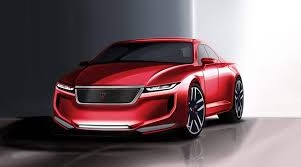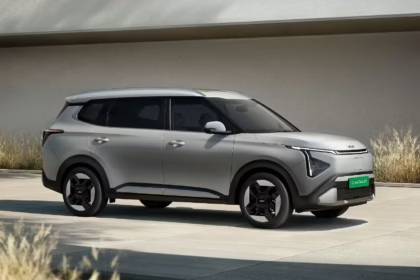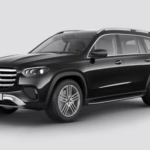Introduction
The Triton EV is a new entrant poised to revolutionize the Indian automotive sector. The company is based in the United States but is fast developing its presence in India. It’s not only stepping into the EV space — it’s bringing along a vision for the future fueled by innovation, in-house developed technology, and international manufacturing scale.
The Triton EV is aiming big — with luxury electric SUVs, hydrogen fuel cell trucks, a massive Gujarat giga factory, and an in-house integrated supply chain that includes battery and chip manufacturing. What sets Triton’s strategy apart is its combination of American R&D prowess and India’s manufacturing capability. This combination can make it one of the select few EV manufacturers poised to compete in both Indian and international markets.

The Triton EV is set to launch five significant strategic actions — each aimed at upending a segment of the EV ecosystem. From infrastructure and innovation to exports and customer access, these actions have the potential to put Triton EV at the forefront of India’s clean mobility revolution.
- Global DNA, Indian Focus: US-based company constructing a mega facility in Gujarat
- Beyond Autos: Entering personal and commercial EV segments (SUVs + trucks)
- In-House Tech: In-house battery, chip, and motor production capabilities
- Eco + Scale: Gigafactory plans to make EVs scalable, sustainable, and export-capable
- Vision 2025: Five robust strategies to challenge giants like Tata, Mahindra, and Tesla
Move 1: Gigafactory Push – India’s Largest EV Manufacturing Setup
Triton EV’s most audacious and revolutionary step starts in the sprawling, industrial wasteland of Kutch, Gujarat, where the company is constructing one of India’s largest integrated EV manufacturing complexes. Unlike conventional auto factories that rely on fragile supply chains, Triton’s next giga factory is planned as an in-house ecosystem for electric vehicle manufacturing, encompassing everything from vehicle assembly to battery packs and even semiconductors.
The unit will be a milestone not only for Triton, which spans 2000 acres, but also for India’s EV journey. It is not only intended to produce premium electric SUVs and commercial vehicles, but it is also aimed at making India a global clean-tech hub for advanced components, such as lithium battery cells and power electronics, all in one plant.
The Triton EV has easy connectivity to ports and industry corridors, enhancing its export potential for EVs to the rest of the world. What makes this factory unique is its implementation of Industry 4.0-grade automation, green energy inputs such as solar and hydrogen, and a strong emphasis on sustainable, high-speed production. This giga factory is not merely a factory — it’s Triton’s platform for propelling India into the next chapter of electric mobility. With it, the firm isn’t simply manufacturing cars — it’s creating the building blocks of an autonomous EV ecosystem that will rival the finest in the world.
- Location: Kutch, Gujarat — strategically located for port connectivity and industrial ecosystem
- Integrated Manufacturing: EVs, batteries, hydrogen fuel cells, and semiconductors all in-house
- Employment Generator: Expected to generate over 10,000 direct and indirect jobs
- Make in India Milestone: Conforms to the nationwide goals for domestic EV manufacture and technology autonomy
- Export-Ready: Configured to cater to both the Indian market and global EV orders
- Smart Factory Tech: Implementation of AI, robotics, IoT-enabled quality check, and clean energy infrastructure
Move 2: Launch of Made-in-India Electric Trucks & SUVs
Triton EV’s most audacious and disruptive action starts in Kutch, Gujarat — the vast, industrial expanse where one of India’s largest integrated EV manufacturing complexes is being constructed. While conventional auto factories rely on fragmented supply chains, Triton’s upcoming giga factory is designed as a one-stop shop for electric vehicle manufacturing, encompassing everything from vehicle assembly to battery packs and even semiconductors.
The facility will cover more than 2000 acres and will be a milestone not only for Triton but also for India’s EV journey. The target is not only to manufacture premium electric SUVs and commercial vehicles, but also to establish India as a hub for world-class clean-tech components such as lithium battery cells and power electronics — all in one place.
This strategic placement also provides Triton with convenient access to ports and industrial hubs, bolstering its capability to export EVs around the world. What sets this factory apart is that it leverages Industry 4.0-grade automation, utilizes green energy sources such as solar and hydrogen, and places a strong emphasis on sustainable, high-speed production.
- Location: Kutch, Gujarat — strategically selected for port access and industrial ecosystem
- Integrated Manufacturing: EVs, batteries, hydrogen fuel cells, and semiconductors all in-house
- Employment Generator: Anticipated to generate more than 10,000 direct and indirect employment opportunities
- Make in India Milestone: Supports national ambitions of local EV manufacturing and technology self-reliance
- Export-Ready: Facilitated both for the Indian market and global EV demand
- Smart Factory Tech: Implementation of AI, robotics, IoT-based quality assurance, and renewable energy infrastructure
Move 3: In-House Battery Production with Long-Range Tech
The Triton EV is not relying on imports or third-party vendors for its most critical components. Triton’s battery plan centers on high-energy-density cells that provide over 500 km of range per charge — an essential standard for consumer confidence and business applicability. However, Triton is not looking to advance conventional lithium-ion technology merely. The firm has already initiated R&D on future generations of battery chemistries such as solid-state batteries and lithium substitutes with faster charging, improved thermal management, and extended life cycles.
Triton EV not only achieves cost and quality control but also reduces its reliance on international supply chains. This is particularly significant during a time when imports of batteries are exposed to price fluctuations and geopolitical risks. The firm’s battery division is also developing thermal management systems to ensure optimal performance in India’s hot areas, as well as safety features such as fire resistance and pressure relief valves.
- Target Range: 500–700 km per charge across SUV and truck models
- Advanced Chemistry: Lithium-ion base + R&D into solid-state and graphene-based cells
- Built for India: Tested for heat resilience, shock absorption, and water resistance
- Safety First: Overheat protection, intelligent BMS (Battery Management System), and strong casing
- Export-Ready Cells: Targeting to provide batteries to global EV markets by 2026
- Local Manufacturing: Batteries to be made at Triton’s Gujarat giga factory
Move 4: Strategic U.S.-India Technology Collaboration
Triton EV is its cross-continental model of innovation — combining world-leading research in the U.S. with high-volume manufacturing in India. This particular synergy enables Triton to bypass the conventional development cycle, bringing global EV technology to Indian roads more quickly and cost-effectively than many incumbent automakers.
The center of this collaboration is Triton’s U.S. R&D center, where specialists in electric mobility, artificial intelligence, and autonomous systems are developing the future of vehicle technology. From intelligent ADAS (Advanced Driver Assistance Systems) to AI-assisted diagnostics, energy optimization, and software updates over the air, Triton’s vehicles are being engineered to provide an authentic digital driving experience.
It is then transferred and redeveloped on Triton’s Indian manufacturing lines — tailoring it to local road conditions, climate, and infrastructure. The outcome? Intelligent EVs that are not only globally leading but also cost-effective, robust, and scalable for the Indian market.
Triton EV is also set to utilize its Indian facility as an export hub for the world, exporting electric trucks and SUVs to Africa, the Middle East, Southeast Asia, and ultimately, portions of Europe and North America. By doing so, it puts India at the center of a new global EV supply chain driven by efficiency and innovation.
- R&D in the U.S.: AI, autonomous drive, battery management, and intelligent UI/UX
- Made in India: Large-scale domestic production of EVs, batteries, and parts in Gujarat
- Tech Localization: Indian road conditions, cost competitiveness, and safety regulations-inspired innovations from across the world
- Innovative Vehicle Features: Driver assist, voice AI, predictive service, and IoT sensors
- Export Focus: India as a platform for catering to high-demand EV markets globally
- Public-Private Support: Alignment with the Indian government’s ‘Make in India’ and ‘Atmanirbhar Bharat’ objectives
Move 5: Nationwide Charging Network & Service Ecosystem
Triton EV is aware that creating world-class electric vehicles is just half the challenge — true success with EV adoption hinges on infrastructure, reliability, and access to services. That’s why its fifth strategic action centers on developing a strong national network of charging, maintenance, and long-term customer care.
The firm will introduce high-speed EV charging facilities along India’s prominent highways, city centers, and prime logistics corridors. The chargers will have a fast-charging capacity compatible with Triton’s trucks and SUVs, allowing for 0–80% charging in under 45 minutes.
Triton EV is also testing out battery swapping stations — a logistics and delivery company game-changer where downtime translates to loss. The swap approach will enable vehicles to swap out spent batteries for new, charged ones within less than 5 minutes, increasing operating efficiency and reducing costs.
This will be supported by a tech-based service ecosystem, driven by AI-driven diagnostics and predictive maintenance solutions. Triton vehicles will be fitted with IoT sensors that transmit real-time information to the company’s backend system, enabling proactive service notification, remote diagnostics, and software updates — similar to Tesla’s service strategy. The Triton EV also has plans for Tier-2 and Tier-3 dealer and service expansion, making its vehicles available for purchase, servicing, and support in the heartland of India.
- Charging Network: High-speed EV chargers on highways and metro clusters
- Battery Swapping: Pilot projects for commercial vehicles in high-density logistics zones
- AI-Powered Support: Smart diagnostics, remote troubleshooting, and OTA updates
- Service Expansion: Over 300 service points and dealerships to be set up in towns and cities
- Quick Turnaround: 80% charge in less than 45 minutes at quick-charging stations as a goal
- Connected Vehicles: Cars connected to backend infrastructure for real-time check-ups
Competitive Edge
Triton EV is entering an extremely competitive and rapidly evolving EV landscape in India, where local behemoths such as Tata Motors, Mahindra Electric, and Ola Electric have already made significant early strides.
Triton EV is not playing catch-up — it’s playing to lead, by concentrating on three strong pillars: scale, technology depth, and design appeal globally. While companies specializing in electric scooters or small city cars, Triton is establishing a diversified product portfolio comprising premium electric SUVs, hydrogen trucks, and autonomous-ready vehicles — all made in India, for India, and the world.
Triton EV has the economies of scale to produce not only cars, but also batteries, motors, and semiconductors in-house. This vertical integration enables it to have better control of quality, pricing, and schedules compared to many of its rivals that rely on imports or outsourcing.
Triton’s cars introduce a world styling language — futuristic, bold, and digitally intelligent — that presents a profound counterpoint to the old-world or functional designs of many EVs in India. Its intelligent interiors, AI capabilities, and extended range appeal may appeal to city buyers seeking a Tesla-like experience at an affordable price.
Triton EV is not only positioning itself as a local EV player, but also as an Indian EV exporter to the world. That presents it with a vision and business model outside of India — something that few EV startups have achieved so far.
- Full-Stack Manufacturing: Cars, batteries, motors, chips — all manufactured under one roof
- Performance + Range: 500+ km range with intelligent, luxury-grade interiors
- AI & Autonomy Ready: Next-gen features are still uncommon in Indian EVs
- Diverse Lineup: Commercial trucks and premium SUVs — not merely mass-market EVs
- Export Ambitions: India as a springboard for global electric vehicle distribution
- Global Aesthetic: Pure, futuristic design language custom-designed for premium appeal
Triton EV vs Other EV Brands
| Feature/Parameter | Triton EV | Tata Motors EV | Mahindra Electric | Ola Electric | BYD India |
| Vehicle Type | SUVs, Trucks (Commercial + Luxury) | Hatchbacks, SUVs | SUVs, Last-mile Commercial EVs | Scooters | Sedans, SUVs |
| Range (Top Models) | 500–700 km | 300–450 km | 250–400 km | 100–180 km | 500+ km |
| Battery Manufacturing | In-house (India) | Outsourced | Outsourced | Outsourced | In-house (China) |
| Autonomous Tech Readiness | Yes (ADAS + AI Integration) | Limited (Basic ADAS) | No | No | Partial ADAS |
| Charging Infrastructure Plans | Pan-India fast chargers + swap | Partner-based chargers | Partner-based | Ola Hyper charger Network | Own + partner infrastructure |
| Export Focus | Yes (Global) | No (India-focused) | Limited | No | Yes (Global) |
| Design & Interiors | Global styling + digital cockpit | Functional, practical | Basic, value-focused | Minimalistic | Premium |
| Manufacturing Location | Gujarat, India (Gigafactory) | India | India | India | China + CKD in India |
| Target Segment | Mid to premium + commercial fleet | Budget to mid-range | Budget/fleet operators | Urban youth (2W only) | Premium car buyers |
Final Thoughts
Triton EV is not only introducing electric vehicles — it is creating a whole ecosystem of innovation, infrastructure, and smart mobility. From establishing one of India’s largest EV giga factories to launching smart, high-performance electric SUVs and trucks, and supporting it all with state-of-the-art battery technology and AI-powered support systems, Triton is revolutionizing what can be accomplished in India’s EV market. If all goes well, 2025 might mark the year India makes a bold move into the premium EV market, with Triton leading the way. While legacy players and startups will continue to grapple with the elephants of electrification, Triton’s aggressive, full-stack approach may turn it into the breakthrough name that rewrites India’s story in the global electric mobility revolution.
FAQs
Q1. What is Triton EV, and where is its base located?
Triton EV is an electric vehicle firm with headquarters in the United States, and a large-scale manufacturing hub is being established in Kutch, Gujarat, India.
Q2. What vehicles will Triton EV launch in India?
Triton will introduce electric SUVs, commercial trucks, and hydrogen-based long-distance haulage vehicles specific to the Indian market from 2025.
Q3. When will India see the availability of Triton EV vehicles for sale?
Triton EV is expected to start producing vehicles towards the end of 2024, with bookings and official launches scheduled to begin by mid-2025.
Q4. How long can Triton EVs run on a single charge?
Triton aims for a 500–700 km single-charge range on its electric SUV and truck models, depending on the model and battery type.
Q5. Will Triton install EV charging stations in India?
Yes, Triton is going to install a countrywide high-speed charging network, service stations, and battery swapping units for commercial purposes.
Q6. Is Triton EV superior to Tata or Ola in the EV segment?
Although Tata and Ola control the mass-market EV segment, Triton is targeting premium SUVs and electric trucks with high-technology features and international design standards.
Q7. Will Triton EV cars be affordable?
Triton EV’s initial lineup might appeal to premium customers, but the company is scaling up production to provide competitively priced EVs for mass market adoption in the years to come.




